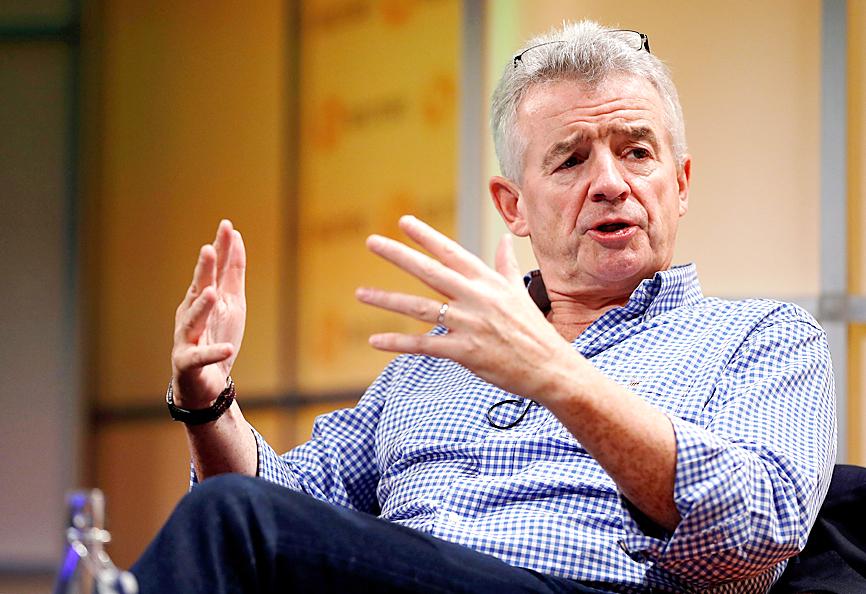Irish no-frills airline Ryanair Holdings PLC yesterday announced a narrowing of losses during its first half as the lifting of travel restrictions saw passenger traffic more than double.
Ryanair’s net loss for the six months to the end of September came in at 48 million euros (US$55.54 million), which compared to a loss after tax of 411 million euros a year earlier.
The Dublin-based carrier that flies mainly throughout Europe said in its earnings statement that the group’s recovery primarily occurred during its second quarter, or three months to the end of September.

Photo: Reuters
“Following a very badly disrupted first quarter, which saw most Easter flights canceled and a slower than expected easing of EU government travel restrictions ... traffic rebounded in Q2 with the successful rollout” of the EU’s vaccine passport, Ryanair chief executive Michael O’Leary said.
Ryanair said its passenger numbers soared by 128 percent to 39.1 million in its first half.
Revenue increased 83 percent to 2.15 billion euros.
“In recent weeks, we have seen a surge in bookings for the October mid-term [school] and Christmas breaks and we expect this peak buoyancy to continue into Easter,” O’Leary said.
It still expects a full-year loss of 100 million to 200 million euros.
The company recently announced plans to create more than 5,000 jobs over the next five years as the aviation sector recovers. It was among the airlines that cut thousands of jobs last year as COVID-19 grounded planes.
The industry has since been boosted by the lifting of international travel restrictions — with full reopenings held back by the Delta variant of SARS-CoV-2.
Ryanair said it is considering exiting the London Stock Exchange amid a material decline in share volumes in the wake of Britain’s split from the EU.
O’Leary said the step is an “inevitable consequence of Brexit” and the regulatory requirements the split presented, while chief financial officer Neil Sorahan said that less than 10 percent of shares are now traded through London.
In December last year, it banned non-EU citizens, including Britons, from buying its ordinary shares and eliminated the voting rights of holders.
In September, it forced the sale of 1 million shares purchased since the breakup out of compliance with its ownership rules.
Additional reporting by Bloomberg

Shares in Taiwan closed at a new high yesterday, the first trading day of the new year, as contract chipmaker Taiwan Semiconductor Manufacturing Co (TSMC, 台積電) continued to break records amid an artificial intelligence (AI) boom, dealers said. The TAIEX closed up 386.21 points, or 1.33 percent, at 29,349.81, with turnover totaling NT$648.844 billion (US$20.65 billion). “Judging from a stronger Taiwan dollar against the US dollar, I think foreign institutional investors returned from the holidays and brought funds into the local market,” Concord Securities Co (康和證券) analyst Kerry Huang (黃志祺) said. “Foreign investors just rebuilt their positions with TSMC as their top target,

H200 CHIPS: A source said that Nvidia has asked the Taiwanese company to begin production of additional chips and work is expected to start in the second quarter Nvidia Corp is scrambling to meet demand for its H200 artificial intelligence (AI) chips from Chinese technology companies and has approached contract manufacturer Taiwan Semiconductor Manufacturing Co (TSMC, 台積電) to ramp up production, sources said. Chinese technology companies have placed orders for more than 2 million H200 chips for this year, while Nvidia holds just 700,000 units in stock, two of the people said. The exact additional volume Nvidia intends to order from TSMC remains unclear, they said. A third source said that Nvidia has asked TSMC to begin production of the additional chips and work is expected to start in the second

REVENUE PERFORMANCE: Cloud and network products, and electronic components saw strong increases, while smart consumer electronics and computing products fell Hon Hai Precision Industry Co (鴻海精密) yesterday posted 26.51 percent quarterly growth in revenue for last quarter to NT$2.6 trillion (US$82.44 billion), the strongest on record for the period and above expectations, but the company forecast a slight revenue dip this quarter due to seasonal factors. On an annual basis, revenue last quarter grew 22.07 percent, the company said. Analysts on average estimated about NT$2.4 trillion increase. Hon Hai, which assembles servers for Nvidia Corp and iPhones for Apple Inc, is expanding its capacity in the US, adding artificial intelligence (AI) server production in Wisconsin and Texas, where it operates established campuses. This

Garment maker Makalot Industrial Co (聚陽) yesterday reported lower-than-expected fourth-quarter revenue of NT$7.93 billion (US$251.44 million), down 9.48 percent from NT$8.76 billion a year earlier. On a quarterly basis, revenue fell 10.83 percent from NT$8.89 billion, company data showed. The figure was also lower than market expectations of NT$8.05 billion, according to data compiled by Yuanta Securities Investment and Consulting Co (元大投顧), which had projected NT$8.22 billion. Makalot’s revenue this quarter would likely increase by a mid-teens percentage as the industry is entering its high season, Yuanta said. Overall, Makalot’s revenue last year totaled NT$34.43 billion, down 3.08 percent from its record NT$35.52